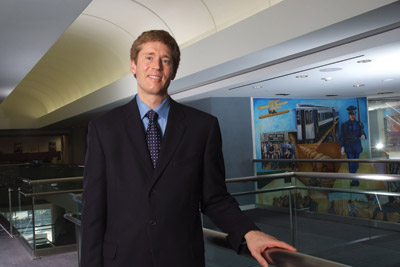Paul Revered
Paul Ferguson is Northern Virginia’s most refreshingly down-to-Earth, friend-of-the-Earth politician—and he’s determined to save the planet one light bulb at a time
By Ken Budd, BA English ’88, MA English ’97
 Even now, six months after the New Year’s Day speech that launched one of the nation’s most aggressive plans to attack global warming, Arlington County Board Chair Paul Ferguson, JD ’92, seems surprised by his status as a local eco-icon. His bold initiative to slash the county’s carbon dioxide (CO2) emissions earned front-page coverage in the Washington Post, followed by a flattering Metro section profile and a meeting on Capitol Hill with top Senate Democrats. Not bad considering that Ferguson feared the speech—an inaugural address to the board on an eerily warm 65-degree winter day—might turn off residents who think local government is more about basic services than global responsibilities.
Even now, six months after the New Year’s Day speech that launched one of the nation’s most aggressive plans to attack global warming, Arlington County Board Chair Paul Ferguson, JD ’92, seems surprised by his status as a local eco-icon. His bold initiative to slash the county’s carbon dioxide (CO2) emissions earned front-page coverage in the Washington Post, followed by a flattering Metro section profile and a meeting on Capitol Hill with top Senate Democrats. Not bad considering that Ferguson feared the speech—an inaugural address to the board on an eerily warm 65-degree winter day—might turn off residents who think local government is more about basic services than global responsibilities.
“All I could think about was Jimmy Carter in his sweater,” says Ferguson in his modest Clarendon office, recalling Carter’s much-ridiculed 1979 energy-crisis speech. He needn’t have worried: county residents not only approve of his initiative, they have encouraged him to take it further. His climate strategy, called Fresh Aire (Arlington Initiative to Reduce Emissions), will cut the county’s CO2 emissions 10 percent by 2012. To reach this goal, Arlington is buying more wind-generated electricity, strengthening its green-building policies, and planting 1,200 trees, to name just a few of Fresh Aire’s more refreshing ideas. In one of its most creative measures, the county is offering free energy audits to 20 Arlington residents, betting that word of mouth will spur others to evaluate their home energy use.
Ferguson’s Footprints
So how carbon-conscious is Paul Ferguson? We took a look at his CO2 footprint and his impressively green lifestyle.
Wheel or No Wheel
Ferguson often takes the bus or Metro to work and hasn’t owned a car since 1994 (he also bicycles about once a month). His wife, Karen Keyes, JD ’91, drives a 2002 Volvo wagon, but she says they’re buying a second car so he can help haul their two kids. And yes, the new car will be a hybrid.
The Bright Stuff
After signing up for a home energy audit (you can try an online version at hes.lbl.gov), Ferguson switched to compact fluorescent bulbs and improved his home’s insulation. He also intends to upgrade to energy-efficient appliances, starting with the fridge.
Swap Meat
Ferguson is a vegetarian, and while he doesn’t expect everyone to give up bratwursts and burgers, he notes that the meat biz hurts the environment, from high water use for cattle farming to chicken waste that flows into streams.
Mug Addict
Bottled water? Doesn’t buy it. Too much plastic is produced, and fossil fuels are burned to transport the bottles. He also avoids cardboard or Styrofoam coffee cups by carrying a reusable mug.
Pile Power
The Arlington County Board sells compost bins at a reduced cost, and although he would love to compost, he can’t because of his condominium association rules.
How Green Was My Building
Office buildings are bigger contributors to global warming—they are even worse than autos, says Ferguson. The building where the county board is housed was recently renovated and is now energy efficient. “And we’re saving money,” he adds.
“The Arlington plan is unusual, particularly for Virginia but also for the nation,” says Mark Wolfe, executive director of the National Energy Assistance Directors’ Association, an energy-policy organization in Washington, D.C.
Actually, the emissions plan is a lot like Ferguson himself: ambitious yet unpretentious. A lifelong Arlingtonian and lover of the outdoors, his first environmental action came as student bar president at Mason’s Law School, where he started the campus recycling program. Ferguson was green long before it was legislatively fashionable, proposing planet-friendly initiatives when he was elected to the county board in 1996. Al Gore’s An Inconvenient Truth convinced him of the need to cut greenhouse gases, but it was no revelation. An environmental bookworm—copies of books such as James Lovelock’s The Revenge of the Gaia stand prominently on the window sill in his third-floor office—Ferguson has studied global warming with a lawyer’s scrutiny and easily launches into detailed discussions of the coal industry, coastal flooding, and climate trends.
“His environmental credentials put him among the top level of elected officials in this area,” says Rick Keller, Arlington issues cochair of the Sierra Club’s Mount Vernon Group. “He’s really tuned into the issues, particularly global warming, and really wants to do something.”
A key to Ferguson’s eco-appeal is that he’s no self-righteous environmentalist. In 1989, he became a vegetarian, the result of touring an Iowa meatpacking plant while working on Sen. Joseph Biden’s presidential campaign. Yet he has no qualms about letting his kids eat chicken nuggets. Rather than sermonize, he leads by quiet example.
“I feel that if I show that something can be done, it may cause others to say, ‘I’ll give that a try,’ ” says Ferguson. “There are many people in Arlington who go far beyond what I do on a personal level for the environment, but I can identify with the average citizen. I’ve got some constraints, so I understand that people’s finances and family situations don’t always allow them to do as much as they’d like.”
Ferguson sells citizens on the cost savings of energy-efficient measures and makes it easy for them to participate. “We try to give people something painless to do so they can be part of the solution. We give away energy-efficient light bulbs, we offer a tax break for driving a hybrid—these are no-brainers,” he says.
Staying on the board would also seem like an easy decision, but Ferguson is moving on at the end of the year. “When I started I said I would run for two or three terms, and I’m at that point,” he says. Next up: a bid to become Arlington clerk of the circuit court (the election is November 6), though he’ll continue to push environmental issues through a variety of influential organizations, such as the Washington Counsel of Governments and the National Association of Counties, and as board chair of Earthcraft, a nonprofit that helps builders construct energy-efficient homes. And while many Americans have gone from denying global warming to thinking it’s unsolvable, Ferguson insists it’s a fight that still can be won.
“Americans are optimists,” he says. “We’re winners. But it’s going to take strong actions that are not occurring now. Whether we as a nation have the will to do that, countering those who have a financial interest in keeping our energy policy the way it is, is a big challenge. But we can do it.”

